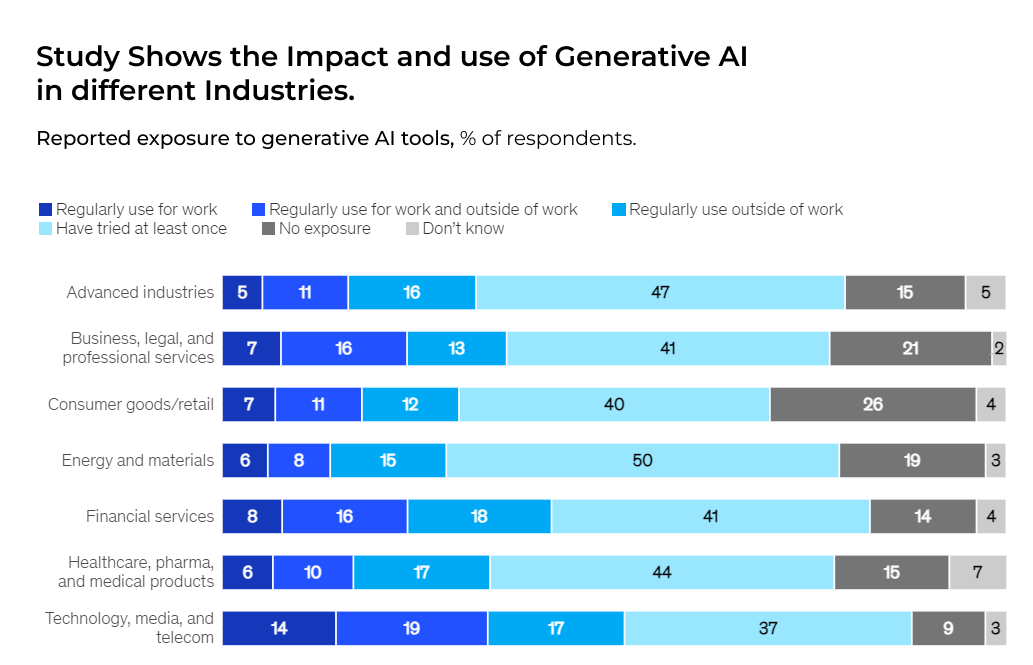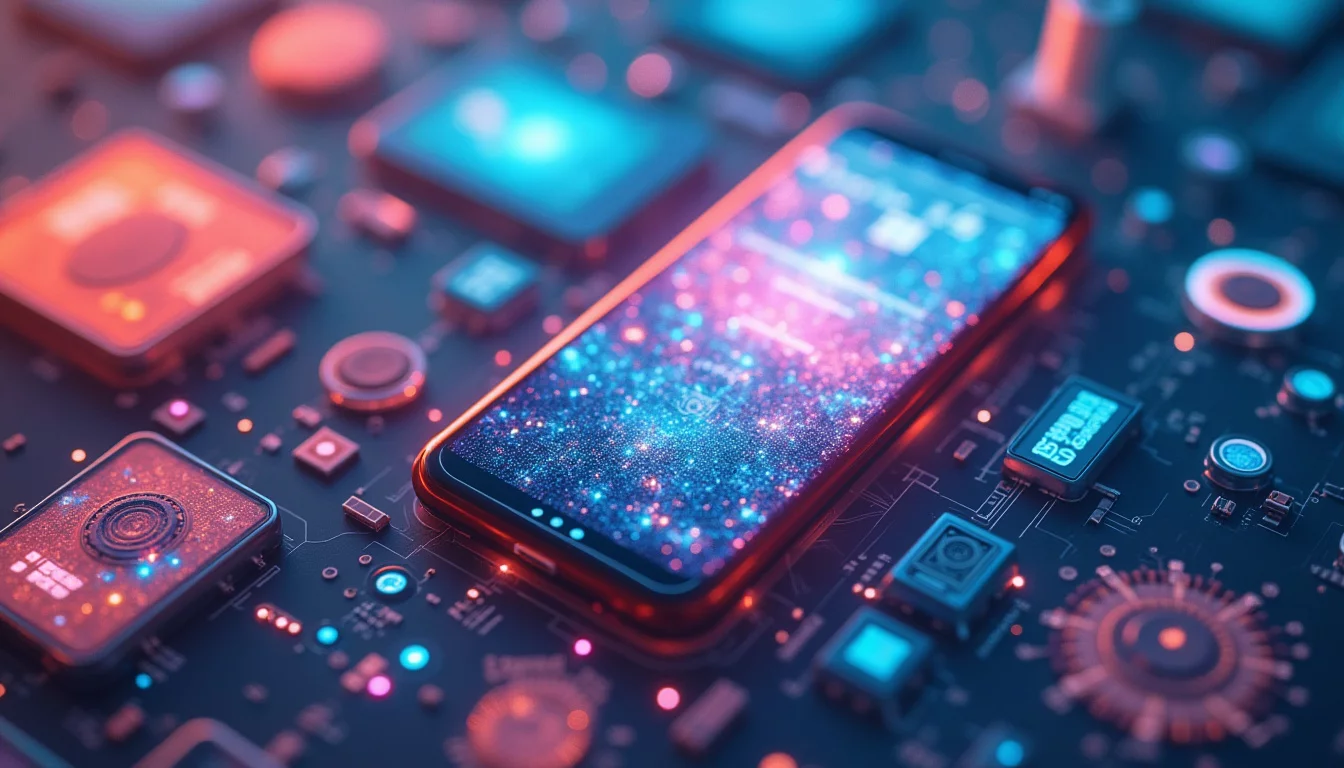The world of work is constantly evolving, driven by technological advancements that shape the way we do our jobs. In recent years, Generative Artificial Intelligence (Generative AI) has emerged as a powerful force in transforming various industries. From content creation to data analysis, Generative AI is changing the way we work in ways that were once thought to be science fiction.
A new McKinsey survey shows that the vast majority of workers—in a variety of industries and geographic locations—have tried generative AI tools at least once, whether in or outside work. That’s pretty rapid adoption less than one year in. One surprising result is that baby boomers report using gen AI tools for work more than millennials.
Source: McKinsey & Company
Let’s explore how Generative AI is revolutionizing the workplace and the impact it is having on various aspects of our professional lives.
How Generative AI Helps in Our Work Life ?
1. Enhanced Creativity and Content Creation
One of the most significant ways Generative AI is changing the way we work is through its ability to enhance creativity and streamline content creation. Generative AI models like GPT-3 have demonstrated their capacity to generate human-like text, which can be harnessed for various purposes. Content creators, marketers, and copywriters can now rely on AI to generate high-quality, coherent text quickly. This not only speeds up the content creation process but also offers new ideas and perspectives, leading to more innovative and engaging content.
Did you know?
In 2018, an artwork created by an AI algorithm called “Edmond de Belamy” was sold at auction for over $432,000. It raised interesting questions about copyright and ownership of AI-generated creations.
2. Streamlined Data Analysis
Data analysis is a crucial part of many industries, and Generative AI is making this process more efficient and insightful. AI algorithms can process and analyze vast datasets, identifying patterns and trends that would be challenging for humans to uncover. This is particularly beneficial in finance, healthcare, and marketing, where data-driven decisions play a crucial role in success.
- Fraud Detection: AI algorithms can analyze large volumes of transaction data to identify anomalies and patterns indicative of fraudulent activity. They can flag suspicious transactions in real-time, allowing for prompt investigation and prevention of financial losses.
- Inventory Management: AI can analyze sales data, historical trends, and external factors to optimize inventory levels. It can predict demand accurately, reducing stock outs and overstocking, and ensuring the right products are available at the right time.
- Predictive Analytics: AI algorithms can analyze historical data, current trends, and external factors to predict future events or outcomes. This allows businesses to anticipate customer behavior, market trends, and potential risks, enabling proactive decision-making.
- Customer Segmentation: AI can analyze customer data, including demographics, purchase history, and online behavior, to segment customers into distinct groups with shared characteristics. This allows businesses to tailor marketing campaigns, product offerings, and customer service strategies to specific customer segments, improving customer satisfaction and loyalty.
- AI Personalization: AI algorithms can analyze individual customer data and preferences to provide personalized experiences, such as product recommendations, content suggestions, and tailored marketing messages. This personalization enhances customer engagement, satisfaction, and conversion rates.
3. Automation of Repetitive Tasks
Automation has been a game-changer in the workplace for decades, but Generative AI takes it to a new level. AI can handle repetitive and time-consuming tasks, such as data entry, document sorting, and customer onboarding, with remarkable accuracy and efficiency. This frees employees to focus on more strategic and creative aspects of their jobs, ultimately boosting productivity and job satisfaction.
4. Language Translation and Global Communication
Generative AI is breaking down language barriers, making global communication more accessible and efficient. Translation services powered by AI can instantly translate text and speech, enabling seamless collaboration between people who speak different languages. This is especially valuable in international business, diplomacy, and cross-cultural collaborations.
5. Improved Decision-Making
AI algorithms are not only adept at data analysis but also at providing insights to inform decision-making. They can predict trends, evaluate risks, and recommend optimal courses of action. In finance, for instance, AI can assess investment opportunities and manage portfolios. In healthcare, AI can help diagnose diseases and suggest treatment plans, leading to more informed and accurate decisions.
6. Training and Education
Generative AI is reshaping how we learn and develop new skills. Educational institutions and businesses are leveraging AI-powered tools to create personalized learning experiences. These tools adapt to the needs of individual learners, providing tailored content and feedback. This not only accelerates the learning process but also makes education more accessible to a global audience.
7. Ethical Considerations
As Generative AI becomes more integrated into the workplace, ethical concerns come to the forefront. Issues related to data privacy, bias in AI models, and the potential for job displacement must be carefully addressed. It is crucial for organizations to implement robust ethical guidelines and regulations to ensure that AI technologies are used responsibly.
How does generative AI affect us?
Generative AI has a profound impact on various aspects of our lives. It is a powerful and versatile technology that influences us in several ways, both positive and negative. Here are some of the keyways in which generative AI affects us:
- Customer Service: Generative AI is increasingly used in customer service, through chatbots and virtual assistants. It affects how we interact with businesses and organizations, offering personalized responses to inquiries, providing recommendations, and simulating human-like conversations. This improves the customer experience and streamlines customer support.
- Privacy and Security: The use of generative AI in creating deepfakes and other potentially harmful applications can threaten individual privacy and security. It affects individuals by raising concerns about the misuse of personal data and digital identity.
Generative AI is transforming the way we work in profound ways. From enhancing creativity to automating repetitive tasks, it is reshaping industries and job roles across the board. However, as with any technological advancement, it brings both opportunities and challenges. It is essential for businesses and individuals to adapt to this new era of work, harness the potential of Generative AI, and address the ethical concerns that come with it. In doing so, we can fully leverage the benefits of Generative AI while ensuring that it enhances our professional lives and the global workforce.












